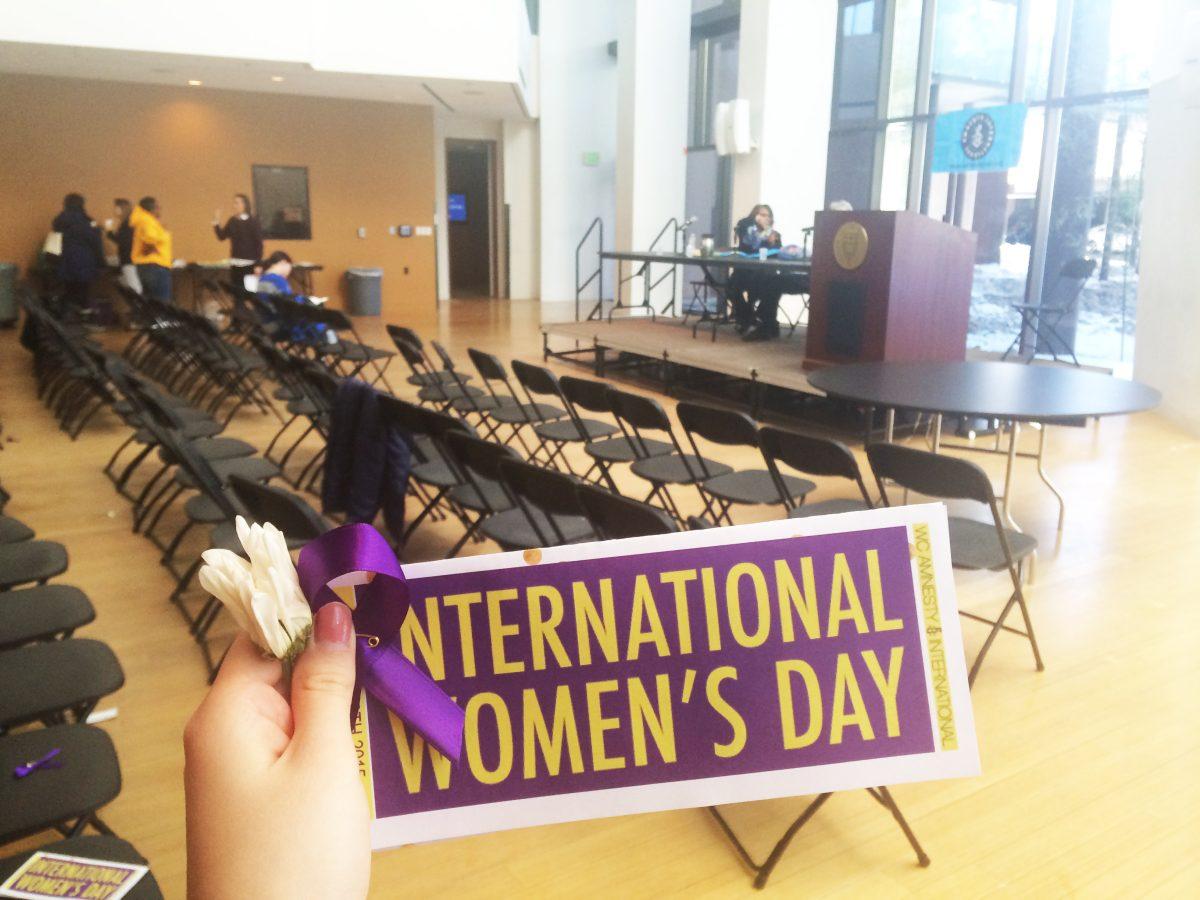At the start of the International Women’s Day celebration last Sunday, Tishman Commons was packed with people there to see the spoken word poet Andrea Gibson. By the end of the event, the number of participants had dwindled down to only a few, but those who stayed had the chance to see events regarding the artistic, political and spiritual achievements of women from across the country.
The event opened with a keynote address from Gibson and then split into two sessions. During the first session participants had a chance to either attend a “Gender at Wellesley” discussion and panel hosted by 20/20 and the student members of the President’s Advisory Committee on Gender at Wellesley or a workshop led by the organization Ladies Involved Putting a Stop To Inner City Killing (L.I.P.S.T.I.C.K). The second session featured a repeat of the same workshop by L.I.P.S.T.I.C.K and a women’s mental health panel.
Gibson’s keynote address was at turns amusing and heartbreaking. The poet, who was originally born in Maine but now lives in Boulder, Colorado, shared poems on subjects ranging from suicide to their beloved dog, and peppered the time between their poems with anecdotes that were a similar mix of humorous and thought provoking. Gibson also talked openly about what it meant to use poetry as a form of activism.
“If I could, I would spend my whole life writing only love poems. But unfortunately the world is in a state that it wouldn’t feel right to spend all of my writing time on that,” Gibson said.
During the keynote address Gibson brought up the indictment in the Mike Brown case and stated that the event helped them to realize their power and responsibility as an artist.
“I have a responsibility as a white artist with a microphone in front of me to be talking about these issues in a way that I am much more of an ally than I have been. My voice has been way too silent on this topic,” Gibson confessed.
During the L.I.P.S.T.I.C.K presentation two members of the organization, Ruth Rollins and Pastor Kim Odom, spoke about the mission of the organization. One of the missions includes getting more people to ask, “Where did the gun come from?” after a homicide. Both women have suffered personal losses due to homicides, which spurred them to join L.I.P.S.T.I.C.K.
They explained that the burden of illegal gun trafficking falls disproportionately on women. Many felons will use love, peer pressure or financial incentives to coerce women to become “straw buyers,” people who buy guns that felons legally cannot buy because of their criminal record. This practice is wrong not only because it increases the homicide rate but also because storing guns can also earn the women time in jail.
According to Odom, the L.I.P.S.T.I.C.K presentation belongs at an international event because the this abuse of women occurs on an international scale.
“What’s happening is not local, it’s not just in one segment of society; it’s a national public health epidemic, and it’s something that has to be addressed on a national and international level. And we are so honored that we got to be a part of this International Women’s Day, because that’s our mission. Our mission is to empower women and girls to refuse to be used to take a life,” Odom said to explain the purpose of her organization.
The gender discussion panel that took place at the same time began with a presentation by the panelists and later opened up to student discussion. The conversation covered topics ranging from the importance of having a safe space for dialogue on campus to the inclusion of prospective students who are designated male at birth but identify as non-binary in the Wellesley community.
Lisa Jenkins ’17, one of the student coordinators and members of Amnesty International, believes the panel was successful.
“I was really impressed at the way we kept it very respectful of all opinions and viewpoints, and I hope that’s the way it seemed to the people in the audience too. That’s my one main hope, that everyone came away feeling like they could voice their concerns and not feel threatened in any way,” Jenkins said.
The mental health panel during the second session included Director of the Stone Center and Interim Dean of the Office of Intercultural Education Dr. Robin Cook-Nobles, Dean of Religious and Spiritual Life Anabel Beerel and two members of Active Minds, Aggie Rieger ’17 and Aly Randell ’16. The panelists discussed the purpose of their organizations and how they could help with mental health problems. They also offered advice to students.
“We are inclined to internalize a lot and we’ve been socialized that it isn’t right for a woman to be too assertive. So we have to be more grounded,” Beerel said to explain why mental health was an important issue to cover at an International Women’s Day event.
Kathryn Cooperman ’15, one of the co-presidents of Amnesty International, listed different disciplines that each presenter showed to demonstrate that although the event’s speakers seemed unrelated they all showcased the variety of impactful roles that women can play.
“Andrea Gibson is so related to poetry and speaks out for women’s rights and gender through the spoken word. L.I.P.S.T.I.C.K. talks about how women can be activists in the community to help stop gun violence. It’s important to remember that women can be involved in all of these different capacities, and it really brought the diversity to our event that we sought to bring,” Cooperman said.
Photos courtesy of Mina Oh ’18
Grace Ballenger ’17 is a Features Editor who is majoring in Spanish and should also be majoring in English based on the number of English classes she is currently taking. She also enjoys playing piano, singing in the choir and drawing. She can be reached at gballeng@wellesley.edu.






